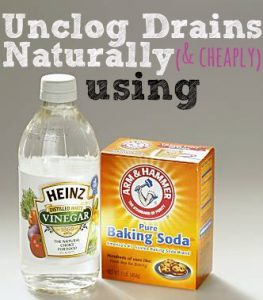 Clear Clogged Drains: A combination of white vinegar and baking soda is a very effective ways to unclog and deodorize drains. To clear clogs in sink and tub drains, use a funnel to pour ½ cup baking soda, ½ cup salt, and lastly 2 cups boiling vinegar. When the foaming subsides, flush with hot tap water. Wait five minutes, and then flush again with cold water. Besides clearing blockages, this technique also washes away odor-causing bacteria.
Clear Clogged Drains: A combination of white vinegar and baking soda is a very effective ways to unclog and deodorize drains. To clear clogs in sink and tub drains, use a funnel to pour ½ cup baking soda, ½ cup salt, and lastly 2 cups boiling vinegar. When the foaming subsides, flush with hot tap water. Wait five minutes, and then flush again with cold water. Besides clearing blockages, this technique also washes away odor-causing bacteria.
Wipe away Mildew: When you want to remove mildew stains, reach for white vinegar first. It can be safely used without additional ventilation and can be applied to almost any surface –bathroom fixtures and tile, clothing, furniture, painted surfaces, plastic curtains, and more.
Deodorize your Garbage Disposal: Here’s an incredibly easy way to keep your garbage disposal unit sanitized and smelling clean: Mix equal parts water and vinegar in a bowl, pour the solution into an ice cube tray, and freeze it. Then simply drop a couple of “vinegar cubes” down your disposal every week or so, followed by a cold-water rinse.
Wash out your Dishwasher: To keep your dishwasher operating at peak performance and remove built-up soap film, pour 1 cup undiluted white vinegar into the bottom of the unit — or in a bowl on the top rack. Then run the machine through a full cycle without any dishes or detergent.
Wash Mildew from Shower Curtains: Clean those ugly mildew stains off your plastic shower curtain by putting it and a couple of soiled towels in your washing machine. Add 1/2 cup laundry detergent and 1/2 cup baking soda to the load, and wash it in warm water on your machine’s regular cycle. Add 1 cup white vinegar to the first rinse. Before the machine goes into the spin cycle, remove the curtain and let it hang-dry.
Shine Ceramic Tiles: If soap scum or water spots have dulled the ceramic tiles around your sink or bath, bring back the brightness by scrubbing them with 1/2 cup white vinegar, 1/2 cup ammonia, and 1/4 cup borax mixed in 1 gallon (3.7 liters) warm water. Rinse well with cool water and let air-dry.
Whiten your Tile Grout: Has the grout between the tiles of your shower or bathtub enclosure become stained or discolored? Restore it to its original shade of white by using a toothbrush dipped in undiluted white vinegar to scrub away the dinginess.
Clean Sinks and Bathtubs: Put the shine back in your porcelain sinks and bathtubs by giving them a good scrubbing with full-strength white vinegar, followed by a rinse of clean cold water. To remove hard-water stains from your tub, pour in 3 cups white vinegar under running hot tap water. Let the tub fill up over the stains and allow it to soak for four hours. When the water drains out, you should be able to easily scrub off the stains.
Shine up your Glass Shower Doors: To leave your glass shower doors sparkling clean — and to remove all of those annoying water spots — wipe them down with a cloth dipped in a solution of 1/2 cup white vinegar, 1 cup ammonia, and 1/4 cup baking soda mixed in 1 gallon (3.7 liters) warm water.
Remove Mineral Deposits from Showerheads: Wash away blockages and mineral deposits from removable showerheads by placing them in 1 quart (1 liter) boiling water with 1/2 cup distilled vinegar for 10 minutes (use hot, not boiling liquid for plastic showerheads). When you remove it from the solution, the obstructions should be gone. If you have a non-removable showerhead, fill a small plastic bag half full with vinegar and tape it over the fixture. Let it sit for about 1 hour, then remove the bag and wipe off any remaining vinegar from the showerhead.
Wipe down Bathroom Fixtures: Pour a bit of undiluted white vinegar onto a soft cloth and use it to wipe your chrome faucets, towel racks, bathroom mirrors, doorknobs, and such. It’ll leave them gleaming.
Fight Mold and Mildew: To remove and inhibit bathroom mold and mildew, pour a solution of 3 tablespoons white vinegar, 1 teaspoon borax, and 2 cups hot water into a clean, recycled spray bottle and give it a few good shakes. Then spray the mixture on painted surfaces, tiles, windows, or wherever you see mold or mildew spots. Use a soft scrub brush to work the solution into the stains or just let it soak in.
Clean Your Washing Machine: An easy way to periodically clean out soap scum and disinfect your clothes washer is to pour in 2 cups vinegar, then run the machine through a full cycle without any clothes or detergent. If your washer is particularly dirty, fill it with very hot water, add 2 gallons (7.5 liters) vinegar, and let the agitator run for 8-10 minutes. Turn off the washer and let the solution stand overnight. In the morning, empty the basin and run your washer through a complete cycle.
Disinfect shower door tracks: Use vinegar to remove accumulated dirt and grime from the tracks of your shower doors. Fill the tracks with about 2 cups full-strength white vinegar and let it sit for three to five hours. (If the tracks are really dirty, heat the vinegar in a glass container for 30 seconds in your microwave first.) Then pour some hot water over the track to flush away the gunk. You may need to use a small scrub brush, or even a recycled toothbrush, to get up tough stains.
Disinfect toilet bowls: Want an easy way to keep your toilet looking and smelling clean? Pour 2 cups white vinegar into the bowl and let the solution soak overnight before flushing. Including this vinegar soak in your weekly cleaning regimen will also help keep away those ugly water rings that typically appear just above the water level.
Clean your toothbrush holder: Get the grime, bacteria, and caked-on toothpaste drippings out of the grooves of your bathroom toothbrush holder by cleaning the openings with cotton swabs moistened with white vinegar.
Wash out your rinse cup: If several people in your home use the same rinse cup after brushing their teeth, give it a weekly cleaning by filling it with equal parts water and white vinegar, or just full-strength vinegar, and let it sit overnight. Rinse thoroughly with cold water before using.



